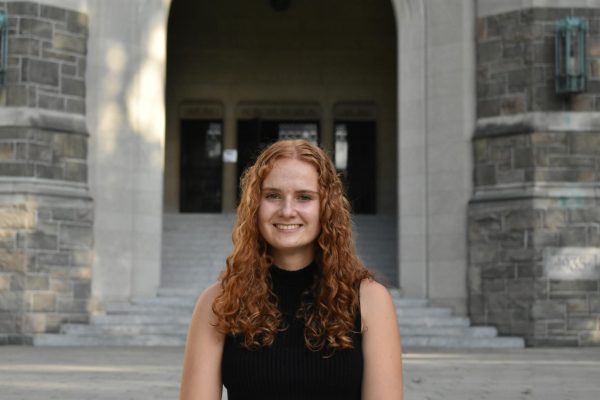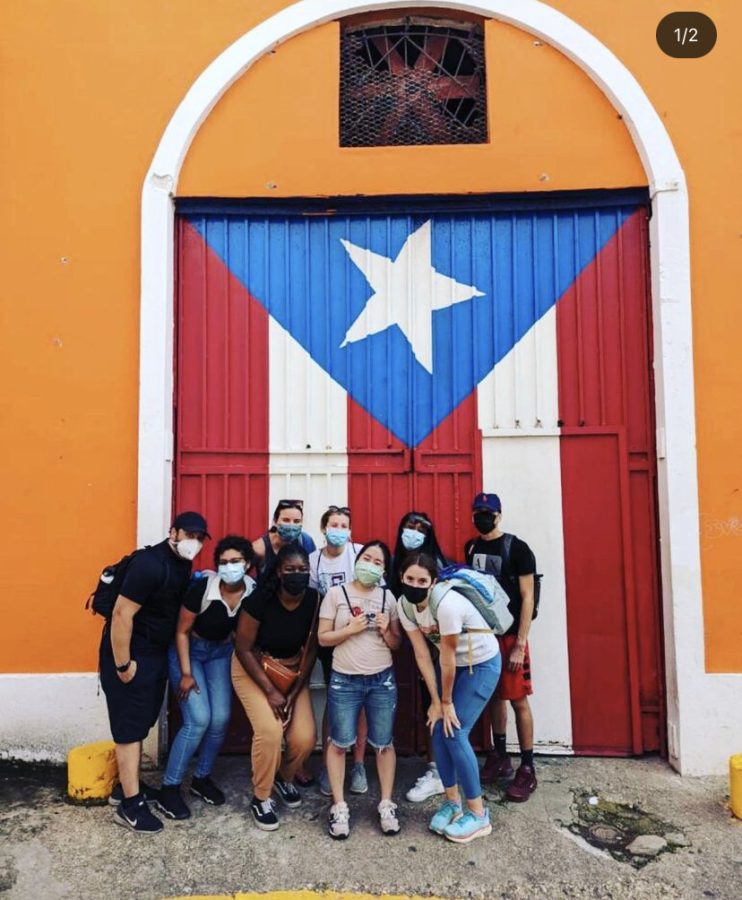Winter Global Outreach Trips Focus on Migration in Puerto Rico and New York
Over winter break global outreach groups travelled to learn about immigration and migration realties.
Over winter break, the Center for Community Engaged Learning (CCEL) sent students on Global Outreach (GO!) trips. Students traveled to Puerto Rico and the Canada-New York border. At both locations, students engaged in academic, service and cultural activities, which all aimed to teach the students about the reality of life in the local communities.
“Our winter cycle was Puerto Rico, Kino Border Initiative and the New York-Canada borders project; they were focused on immigration and migration realities,” said Vanessa Rotondo, assistant director of immersions and senior advisor on Ignatian leadership.
As a program, GO! aims to help connect students with communities and cultures they may not have been exposed to before. While GO! projects may have service elements, they differ from traditional service trips. Instead of solely focusing on providing service to a community, these trips aim to help students become immersed and understand other people’s lives.
“Rather than just going in and doing a tangible direct service and then going on your way, we really work to create these opportunities of direct encounter of humanity,” said Rotondo.
“Students typically spend a good deal of time getting to know our partner, getting to know partner organizations from our partner and really having the opportunity to interact and interface with people in the community. [Students spend time] getting to know the lived realities [of people in the community]. There are service components for sure, [GO! trips] are rooted in community service at the end of the day.”
Global Outreach trips are also student-led. The trips will usually have a student leading the trip and a chaperone. According to Rotondo, the student leadership and engagement aspect of Global Outreach contributes to GO!’s unique learning experience.
“It’s a really great way to experience a different kind of education. It’s student facilitated, and so it breaks down the barrier of having a professor talking at you. Not that our faculty talk at you, but it brings [a] different level of education,” said Rotondo.
Students spent months preparing before they left for Puerto Rico and the New York-Canada border. According to Mari Teli, FCRH ’22, the student leader of the New York-Canada trip, the group focused on working with its partners — New York Immigration Coalition, Alianza Agricola and the Rochester Refugee Resettlement Services — to understand the immigration that happens in upstate New York.
“We learned about the history of migration in upstate as well as immigration policies in New York. We were also able to learn about the refugee and asylee population in upstate and the work the refugee resettlement services do. In addition, we were able to visit Niagara Falls and learn about different murals in the upstate region,” said Teli.
The group on the GO! trip to Puerto Rico also did activities to immerse themselves in the Puerto Rican community that they were visiting.
“They were doing everything from a park cleanup, to cleaning up the community center, to really getting to know the people that would be using that park and community center. [They were able to see] how that work relates to the different environmental advocacy realities of Puerto Rico,” said Rotondo. “After that, they would go out into the city of San Juan. They did a walking tour, saw a few different cultural highlights and learned about them. Then they did historical walking tours too.”
In addition to those initatvives, students on the Global Outreach trip to Puerto Rico had direct engagement with the community when it came to their theme topic, migration.
“We spoke with migrants, spending time with them and hearing their stories of what led them to the Kino Border Initiative shelter in Nogales, Sonora, Mexico. We also listened to border patrol agents, ranchers who live along the border in Arivaca, Arizona, and even the Pima County Medical Examiner, who receives remains of undocumented migrants that die in the desert, and does the work to find their identities and notify their families when possible. The goal of the trip was to understand the realities of life on the border from all different perspectives,” said Lauren Pecora, FCRH ’22, Leader of GO! Puerto Rico.
Global Outreach trips are unique because they take learning outside the classroom, which helps build communities that last for a long time after the trip. “[I went on my first GO! Trip] when I had just graduated undergrad and when I was doing my masters. That community still talks; there are groups of people who are friends because of their Global Outreach experience,” said Rotondo.
One of the main parts of the GO! program is learning how to take tools acquired on the trip back to life at Fordham.
“Our student leaders are trained to see what [Global Outreach] means in the immediate New York community and then integrate that into your lives at Fordham. I’m mindful that you’ll spend the semester in formation; you will go on your immersion and then you come back. There [are] only so many things you can do to stay engaged,” said Rotondo.
“Our student leaders do a good job starting the conversations with our students during formation about ways to stay involved with these social justice topics after the immersion.”
Teli found that learning about how immigration works in New York was influential on the New York-Canada trip.
“My team even got to meet with Assemblywoman Karines Reyes, who worked on passing the Hero Act. I think being informed about immigration policies, especially in the state I go to school in, is important since I believe everyone should be more educated about the things happening in their area and how we as students can spread information that isn’t necessarily often talked about,” said Teli.

Isabel Danzis is a senior from Bethesda, Md. She is double majoring in journalism and digital technologies and emerging media. The Ram has been a very...







































































































































































































